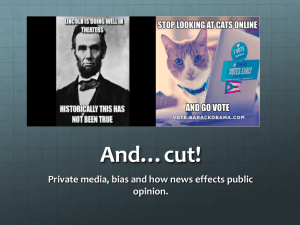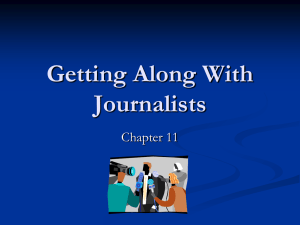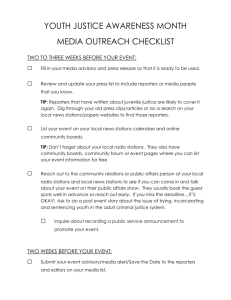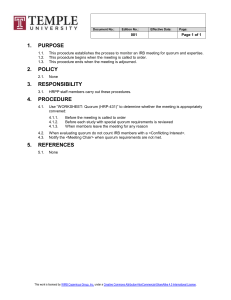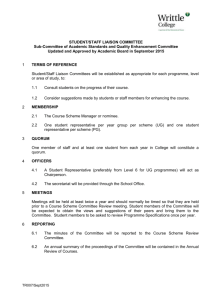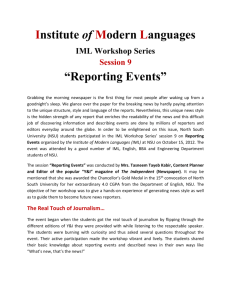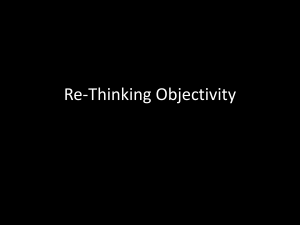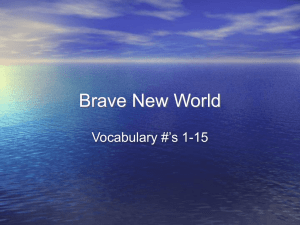Lesson 10
advertisement
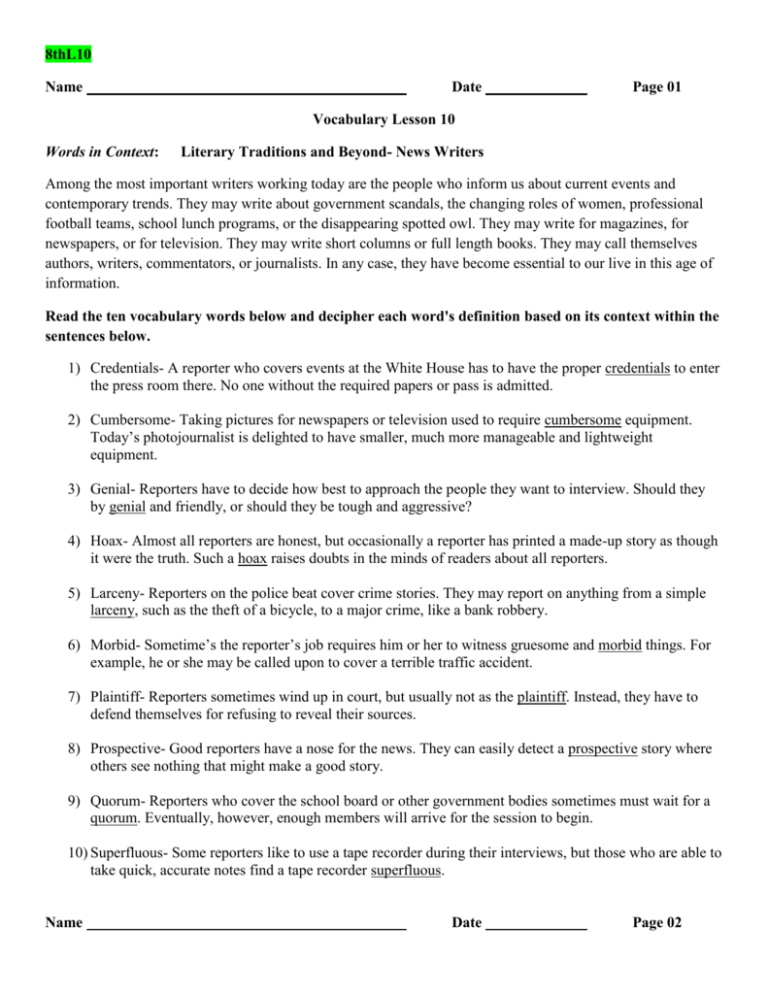
8thL10 Name Date Page 01 Vocabulary Lesson 10 Words in Context: Literary Traditions and Beyond- News Writers Among the most important writers working today are the people who inform us about current events and contemporary trends. They may write about government scandals, the changing roles of women, professional football teams, school lunch programs, or the disappearing spotted owl. They may write for magazines, for newspapers, or for television. They may write short columns or full length books. They may call themselves authors, writers, commentators, or journalists. In any case, they have become essential to our live in this age of information. Read the ten vocabulary words below and decipher each word's definition based on its context within the sentences below. 1) Credentials- A reporter who covers events at the White House has to have the proper credentials to enter the press room there. No one without the required papers or pass is admitted. 2) Cumbersome- Taking pictures for newspapers or television used to require cumbersome equipment. Today’s photojournalist is delighted to have smaller, much more manageable and lightweight equipment. 3) Genial- Reporters have to decide how best to approach the people they want to interview. Should they by genial and friendly, or should they be tough and aggressive? 4) Hoax- Almost all reporters are honest, but occasionally a reporter has printed a made-up story as though it were the truth. Such a hoax raises doubts in the minds of readers about all reporters. 5) Larceny- Reporters on the police beat cover crime stories. They may report on anything from a simple larceny, such as the theft of a bicycle, to a major crime, like a bank robbery. 6) Morbid- Sometime’s the reporter’s job requires him or her to witness gruesome and morbid things. For example, he or she may be called upon to cover a terrible traffic accident. 7) Plaintiff- Reporters sometimes wind up in court, but usually not as the plaintiff. Instead, they have to defend themselves for refusing to reveal their sources. 8) Prospective- Good reporters have a nose for the news. They can easily detect a prospective story where others see nothing that might make a good story. 9) Quorum- Reporters who cover the school board or other government bodies sometimes must wait for a quorum. Eventually, however, enough members will arrive for the session to begin. 10) Superfluous- Some reporters like to use a tape recorder during their interviews, but those who are able to take quick, accurate notes find a tape recorder superfluous. Name Date Page 02 Vocabulary Lesson 10 Scan the definitions in Column A. Then, think about how the boldface words are used in the sentences in Column B. To complete the exercise, match each definition in Column A with the correct Vocabulary Word from Column B. Write the letter of your choice on the line provided. Finally, write the Vocabulary Word on the line before the definition. Homework without a name and date will get a score no higher than 70%. COLUMN A _____ 01. word: n. a person who initiates a lawsuit; the complaining party _____ 02. word: n. written evidence showing that a person has a right to a certain position or authority _____ 03. word: n. thefts; unlawful taking or carrying away of another’s property _____ 04. word: n. the minimum number of members needed at a meeting to make official decisions _____ 05. word: adj. clumsy; unwieldy; hard to handle _____ 06. word: adj. probable; expected in the future _____ 07. word: adj. having an abnormal interest in the unwholesome; gruesome _____ 08. word: adj. more than is needed; excessive; surplus _____ 09. word: adj. favorable to growth or human comfort; kindly and friendly _____ 10. word: n. an act that is intended to fool or deceive; something that has been established by fraudulent means COLUMN B (A) One of the most popular writers of nonfiction was Studs Terkel (1912-2008), whose credentials gave him authority not only as a writer but also as a lawyer. (B) Terkel found writing to be a more genial occupation than law. He thrived in situations where he interviewed ordinary people. (C) For his book Working (1974), Terkel interviewed hundreds of people to ding out how they felt about their jobs. he interviewed people who held all types of jobs, from routine ones, like clerk or hairdresser, to those that seem morbid, such as a funeral director. (D) At first, Terkel’s books may seem large and cumbersome, but you soon forged their bulk because they are actually quite easy to read. (E) For his book American Dreams: Lost and Found (1980), Terkel interviewed a former Miss U.S.A. who felt she had participated in a kind of hoax- that she had misled sponsors or directors, whose values were different from her own. (F) Writers who focus on legal issues usually try to be fair to both sides in a court battle; they interview both the plaintiff and the defendant. (G) Most writers would prefer a more exciting crime than larceny to write about, unless of course the theft involved something important or very valuable. (H) When reporters consider prospective stories, they often think about how much background research they will need to do before they begin covering the events. (I) Reporters who cover local governments know that important action is sometimes taken even before a quorum of committee members is achieved. (J) Reporters also know that it is better to have superfluous information than not to have enough when preparing to write and article. Name Date Page 03 Vocabulary Lesson 10 Sentence Completion Directions. For each of the following items, circle the letter of the choice that best completes the meaning of the sentence or sentences. Homework without a name and date will get a score no higher than 70%. 11) Reporters who cover city-council meetings often spend a lot of time waiting until enough council members show up to make a . (A) quorum (B) hoax (C) credential (D) larceny (E) plaintiff 16) Cutting information from a story is easy, but writers hate it when they have to leave out information they think is important. (A) genial (B) morbid (C) superfluous (D) prospective (E) cumbersome 12) Reporters who use tape recorders are glad to have new, portable models. The old recorders were large and . (A) genial (B) cumbersome (C) prospective (D) superfluous (E) morbid 17) Books about usually do not sell as well as books about murder. People seem to prefer to read about more crimes. (A) quorum…genial (B) credentials…prospective (C) hoaxes…cumbersome (D) larceny…morbid (E) plaintiff…superfluous 13) Reporters who investigate business frauds know that the person who pulls off a successful is usually someone who seems too , or kind, to be honest. (A) quorum…prospective (B) larceny…morbid (C) credentials…cumbersome (D) plaintiff…morbid (E) hoax…genial 18) Researching a crime story can be a task requiring months and sometimes years of a writer’s time. (A) genial (B) superfluous (C) morbid (D) cumbersome (E) prospective 14) Those who think of themselves as journalists must first earn their , usually a college degree in journalism. (A) prospective… credentials (B) genial…credentials (C) cumbersome…quorum (D) superfluous…quorum (E) morbid…larceny 15) When covering the courts, a reporter may encounter many humorous stories. For example, consider the who sued the defendant for stealing the affections of his cat. (A) hoax (B) quorum (C) credentials (D) plaintiff (E) larceny 19) Of course, not all reporters or nonfiction writers focus on , depressing stories; many write about the more aspects of life. (A) genial…morbid (B) genial…larcenous (C) cumbersome…prospective (D) prospective…superfluous (E) morbid…genial 20) Newspaper stories about the homeless or about plans for a cultural museum are not , as some readers may think. They are essential as stories about crime and disease. (A) superfluous…cumbersome (B) prospective…superfluous (C) genial…morbid (D) morbid…genial (E) cumbersome…genial
